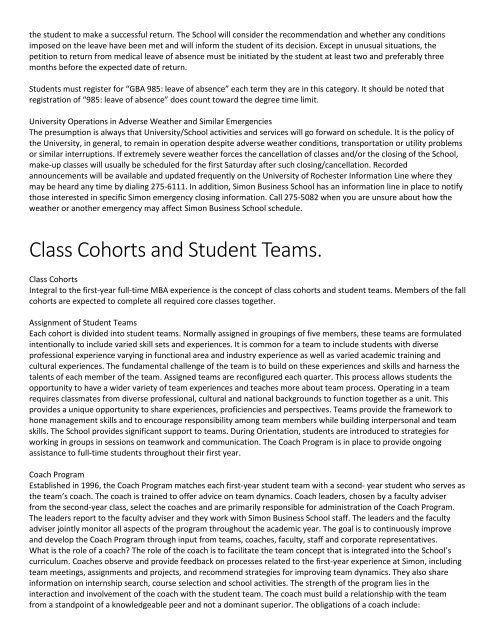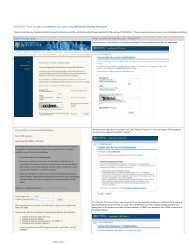mySimon student handbook
You also want an ePaper? Increase the reach of your titles
YUMPU automatically turns print PDFs into web optimized ePapers that Google loves.
the <strong>student</strong> to make a successful return. The School will consider the recommendation and whether any conditions<br />
imposed on the leave have been met and will inform the <strong>student</strong> of its decision. Except in unusual situations, the<br />
petition to return from medical leave of absence must be initiated by the <strong>student</strong> at least two and preferably three<br />
months before the expected date of return.<br />
Students must register for “GBA 985: leave of absence” each term they are in this category. It should be noted that<br />
registration of “985: leave of absence” does count toward the degree time limit.<br />
University Operations in Adverse Weather and Similar Emergencies<br />
The presumption is always that University/School activities and services will go forward on schedule. It is the policy of<br />
the University, in general, to remain in operation despite adverse weather conditions, transportation or utility problems<br />
or similar interruptions. If extremely severe weather forces the cancellation of classes and/or the closing of the School,<br />
make-up classes will usually be scheduled for the first Saturday after such closing/cancellation. Recorded<br />
announcements will be available and updated frequently on the University of Rochester Information Line where they<br />
may be heard any time by dialing 275-6111. In addition, Simon Business School has an information line in place to notify<br />
those interested in specific Simon emergency closing information. Call 275-5082 when you are unsure about how the<br />
weather or another emergency may affect Simon Business School schedule.<br />
Class Cohorts and Student Teams.<br />
Class Cohorts<br />
Integral to the first-year full-time MBA experience is the concept of class cohorts and <strong>student</strong> teams. Members of the fall<br />
cohorts are expected to complete all required core classes together.<br />
Assignment of Student Teams<br />
Each cohort is divided into <strong>student</strong> teams. Normally assigned in groupings of five members, these teams are formulated<br />
intentionally to include varied skill sets and experiences. It is common for a team to include <strong>student</strong>s with diverse<br />
professional experience varying in functional area and industry experience as well as varied academic training and<br />
cultural experiences. The fundamental challenge of the team is to build on these experiences and skills and harness the<br />
talents of each member of the team. Assigned teams are reconfigured each quarter. This process allows <strong>student</strong>s the<br />
opportunity to have a wider variety of team experiences and teaches more about team process. Operating in a team<br />
requires classmates from diverse professional, cultural and national backgrounds to function together as a unit. This<br />
provides a unique opportunity to share experiences, proficiencies and perspectives. Teams provide the framework to<br />
hone management skills and to encourage responsibility among team members while building interpersonal and team<br />
skills. The School provides significant support to teams. During Orientation, <strong>student</strong>s are introduced to strategies for<br />
working in groups in sessions on teamwork and communication. The Coach Program is in place to provide ongoing<br />
assistance to full-time <strong>student</strong>s throughout their first year.<br />
Coach Program<br />
Established in 1996, the Coach Program matches each first-year <strong>student</strong> team with a second- year <strong>student</strong> who serves as<br />
the team’s coach. The coach is trained to offer advice on team dynamics. Coach leaders, chosen by a faculty adviser<br />
from the second-year class, select the coaches and are primarily responsible for administration of the Coach Program.<br />
The leaders report to the faculty adviser and they work with Simon Business School staff. The leaders and the faculty<br />
adviser jointly monitor all aspects of the program throughout the academic year. The goal is to continuously improve<br />
and develop the Coach Program through input from teams, coaches, faculty, staff and corporate representatives.<br />
What is the role of a coach? The role of the coach is to facilitate the team concept that is integrated into the School’s<br />
curriculum. Coaches observe and provide feedback on processes related to the first-year experience at Simon, including<br />
team meetings, assignments and projects, and recommend strategies for improving team dynamics. They also share<br />
information on internship search, course selection and school activities. The strength of the program lies in the<br />
interaction and involvement of the coach with the <strong>student</strong> team. The coach must build a relationship with the team<br />
from a standpoint of a knowledgeable peer and not a dominant superior. The obligations of a coach include:




